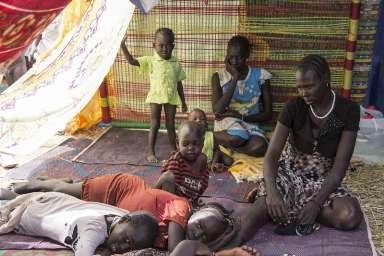IOM expands operations in S. Sudan, calls for more funding
January 8, 2014 (JUBA) – The International Organization for Migration (IOM ) is expanding its operations in South Sudan, describing the crisis needs of people displaced by ongoing conflict in the country as “staggering”.

It is also coordinating sanitation and hygiene services at the UN’s Malakal base in Upper Nile state, which is hosting some 12,000 displaced persons.
The announcement came as the top two United Nations officials in South Sudan travelled to different conflict-affected areas to assess conditions and coordinate the agency’s humanitarian response.
The secretary-general’s special representative, Hilde Johnson, was at the UN base in Malakal on Wednesday, while deputy special representative and humanitarian coordinator Toby Lanzer visited Unity state’s capital, Bentiu.
IOM director general William Lacy Swing, who arrived in Juba on Sunday where he is meeting with IOM staff and humanitarian partners, has expressed concern for the crisis-affected population.
“The needs created by this crisis are staggering. I am deeply saddened by the violence that has affected so many South Sudanese who are simply trying to survive”, Swing said on Tuesday.
FUNDS APPEAL
The IOM has issued an appeal to international donors to contribute $23.2 million in support of the organisation’s humanitarian response to the South Sudan crisis.
It says the provision of adequate shelter and essential household items would make an enormous difference to improving the living conditions of those displaced by the current crisis.
“This work is vital, and we are calling upon our partners in the international community to provide additional funding support so that we can continue to meet the basic needs of South Sudan’s most vulnerable people”, Swing said.
Conflict broke out in the capital on 15 December after clashes between rival factions of the presidential guards, with violence spreading to other areas.
The IOM says the crisis has since forced nearly 200,000 people to flee their homes, with an estimated 62,000 people currently seeking shelter and protection on UN peacekeeping bases, while a further 22,600 people have crossed into neighbouring countries.
According to the IOM, the UN Tomping base in Juba, which is housing about 17,400 people, has exceeded its capacity and is now unable to accommodate any new arrivals.
SECURITY FEARS
The UN Mission in South Sudan (UNMISS) says its peacekeepers are currently providing protection for nearly 30,000 civilians at the two UN bases in the city, where the situation remains “tense”.
UN spokesperson Farhan Haq told reporters in New York on Tuesday that there were reports of large movements of civilians in the Bentiu area, raising fears of further fighting in the area.
There have also been reports of explosions and sporadic gunfire in the vicinity of the UN compound in Jonglei state capital Bor.
UNMISS has confirmed that the situation at its base in Bor, where over 9,000 civilians are being protected, is becoming increasingly strained.
After being blocked for several days, three UN flights were finally able to deliver food supplies to Bor on Wednesday and evacuate 54 civilians to Juba for medical treatment.
“Humanitarian access continues to be constrained by active hostilities, attacks on aid workers and assets, interference with humanitarian activities and other obstacles,” the UN spokesperson said.
The UN said aid agencies are developing contingency plans for any potential additional displacement in the coming weeks, as well as during the rainy season, which is due to start in May.
(ST)
